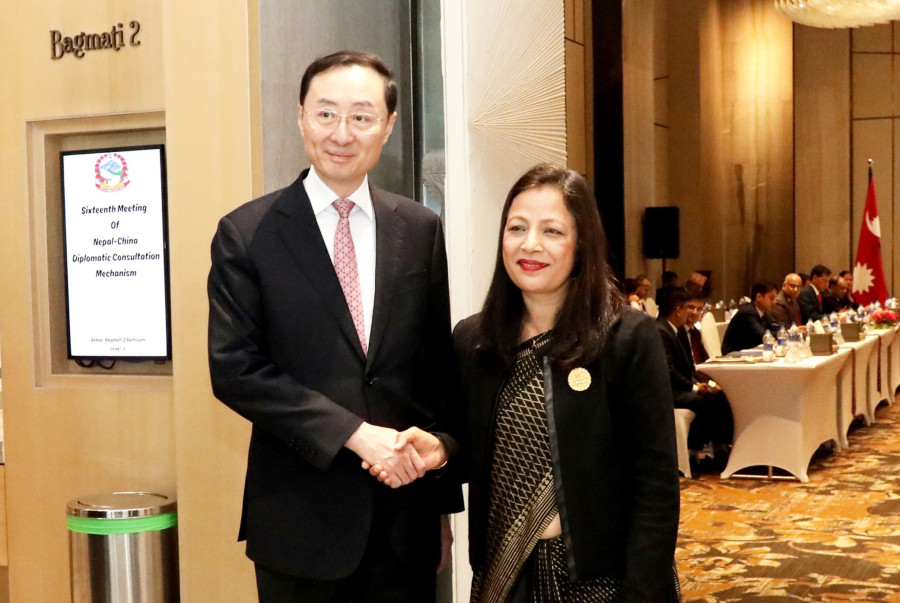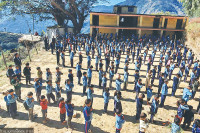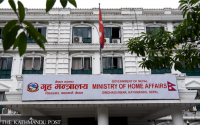National
Funding modalities differences delay BRI execution deal
A minister says China failed to address some of Nepal’s concerns on time. He also hinted at geopolitical factors.
Anil Giri
The plan to finalise the much-debated Belt and Road Initiative Implementation Plan between Nepal and China during the 16th round of the Nepal-China diplomatic consultation mechanism meeting on Tuesday fell through.
After China insisted on sealing the BRI implementation plan during the ongoing visit of its vice Foreign Minister Sun Weidong to Kathmandu, the Ministry of Foreign Affairs recently corresponded with the Prime Minister’s Office seeking approval for signing the implementation plan during the 16th meeting of Nepal- China diplomatic consultation mechanism meeting, which concluded on Tuesday.
Earlier this week, Foreign Secretary Sewa Lamsal wrote to the Prime Minister's Office where she stated that a decision had already been taken at the ministerial level to sign the implementation plan of the Belt and Road Initiative, urging the ministry to sign the agreement during Sun’s visit.
But the press statement issued by the Ministry of Foreign Affairs on Tuesday after the conclusion of the foreign secretary-level meeting does not mention any discussions on the signing of the BRI implementation plan or any other BRI-related topics.
The signing and discussion of the plan were on the agenda of both sides during the meeting.
On Tuesday, Prime Minister Pushpa Kamal Dahal, speaking in Parliament, said discussions were underway to finalise the BRI implementation plan. We are in the final stages of moving forward with it, and an agreement will soon be reached, he said.
The prime minister while responding to lawmakers’ queries on Tuesday said that the implementation plan will be signed either in one or two days or at a later date.
Top government sources had told the Post that if the plan could not be signed during Sun Weidong’s stay in Kathmandu, it is likely to be signed during the Kathmandu visit of Chinese Foreign Minister Wang Yi, who is also the state councillor of China, later this year.
Entitled “Implementation Plan on Jointly Building the Belt and Road Initiative between the People’s Republic of China and the Government of Nepal”, the BRI implementation plan sets over two dozen cooperation priorities.
Sun will wrap up his three-day trip on Wednesday and return to China the same day.
Although the date of Wang’s visit to Nepal is yet to be fixed, he is expected to travel to Kathmandu in August or September.
Prime Minister Dahal also revealed several conditions that Nepal has included in the BRI implementation plan while addressing lawmakers’ queries in Parliament on Tuesday.
Earlier this week, Foreign Secretary Sewa Lamsal wrote to the Prime Minister's Office stating that a ministerial-level decision had already been taken to sign the Plan. Deputy Prime Minister and Minister for Foreign Affairs Narayan Kaji Shrestha took the decision, which was then sent to the PMO for approval, according to the correspondence seen by the Post.
“The Nepal government and the People’s Republic of China signed the memorandum of understanding [MoU] on cooperation under the Belt and Road Initiative on May 12, 2017. In order to implement that plan, the BRI implementation plan needs to be signed,” said the correspondence made by Secretary Lamsal.
In early 2020, the Chinese side sent the first draft of the plan detailing the execution of projects under the BRI, including their funding modalities like loan, grant, and interest rates.
The foreign secretary’s letter explains why Nepal needs to sign the implementation plan.
Lamsal stated that the Ministry of Foreign Affairs has received positive feedback and consensus from the ministries of Finance and Law, Justice, and Parliamentary Affairs and seeks the authority to sign the plan.
Multiple officials involved in the negotiation process told the Post that the agreement was shelved at the last minute due to technical reasons and reservations over the draft.
One reason is that the prime minister could not take the ruling parties into confidence and in fact he did not even consult many of them, said a minister who is aware of the BRI implementation plan related developments. Another reason was that the Chinese side delayed responding to some minor corrections that Nepal had proposed in the draft. “Beijing simply failed to respond on time. More than this, there could also be geopolitical reasons behind the delay in the plan’s signing,” said the minister.
Earlier, after the Nepali side was reluctant to discuss and carry forward the implementation plan due to the Covid pandemic and related restrictions, the Chinese side again sent the next draft in October 2021 to the foreign ministry during the premiership of Sher Bahadur Deuba.
After consulting various line ministries, the Deuba government informed the visiting Chinese foreign minister and state councillor Wang Yi in March 2022 that Nepal prefers grants over loans to fund BRI projects. The government also informed that the interest rate should not exceed one percent, there must be a competitive bidding process, and repayment terms for the concessional loan should be similar to those of the World Bank, Asian Development Bank and other multilateral and bilateral lenders.
Our priority is grant, not loan, said Prime Minister Dahal on Tuesday, while echoing the position of the Deuba government.
“Our first priority is grants, not loans. If we do need to take loans, we will not pay an interest rate higher than what we are paying to the World Bank and Asian Development Bank,” said Prime Minister Dahal in Parliament on Tuesday, stating Nepal cannot afford beyond 1.5 percent annual interest rate proposed for BRI projects.
Nepali Congress lawmakers Prakash Sharan Mahat, Ram Hari Khatiwada, Badri Pandey, and Sishir Khanal of Rastriya Swatantra Party, among others, had asked the government about its efforts to implement the BRI and its implementation plan.
“We are already burdened by debt, so before taking more loans, we have to think twice,” said Mahat.
The prime minister also stated that Nepal is mindful of the debt trap.
“We will push the agreement by ensuring that we won’t fall into a debt trap,” the prime minister said.
Khatiwada questioned, “Why isn’t the government insisting on grants under the BRI?”
The prime minister later clarified any loans taken will not exceed the interest rates paid to the World Bank and the Asian Development Bank.
Multiple officials at the Prime Minister's Office and Ministry of Foreign Affairs told the Post that matters related to loans, grants, concessional loans, and other repayment structures have yet to be settled by the two sides.
There is a lack of harmonisation between the two sides, although the Nepali side has repeatedly insisted on grant and soft loan from China for various projects under the BRI. The text of the BRI implementation plan outlines several areas of cooperation between Nepal and China.
“We have to go for grants. We need donations, and I have also told the Chinese side that we cannot afford an interest rate beyond 1 or 1.5 percent per annum,” said the prime minister in Parliament.
Nepal currently pays a two percent yearly interest rate to China’s EXIM Bank, which funded the construction of the Pokhara International Airport.
Khanal of Rastriya Swatantra Party demanded formal discussion and deliberation of the BRI in Parliament.
Due to a lack of discussion in Parliament, there is unnecessary and negative discourse outside the House, said Khanal.
“We signed the BRI framework agreement with China in 2017. As we never had proper discussion in the House, there was unnecessary discussion and debate outside. That might invite problems in our relations with China,” he said.
The BRI implementation plan got more traction during the China visit of Prime Minister Dahal last year.
A joint statement issued after the visit stated that both sides would conclude the negotiations on the BRI implementation plan and prepare for its signing. The National Planning Commission then expedited consultations with various line ministries, particularly with finance and law ministries.
“After both ministries forwarded their inputs, a new draft emerged,” a minister who is aware of the latest development said.
But there are some reservations from the Chinese side regarding the financing and investment modalities, as the prime minister said during Tuesday’s meeting of the House of Representatives.
“Now the signing has been postponed until further notice. But both sides have assured that the plan would be signed during a high-level visit in the near future,” the minister added.
Consultation mechanism meeting concludes
The 16th meeting of Nepal-China Diplomatic Consultation Mechanism concluded Tuesday.
During the meeting, the two sides reviewed the whole gamut of bilateral relations and assessed progress made in the implementation of agreements and Memorandums of Understanding (MoUs) signed and the decisions made in the past, said the foreign ministry statement.
“They expressed firm commitment to further promote cooperation in mutually agreed areas and committed to work in realisation of economic opportunities for mutual benefits. Both the heads of delegation reiterated that strong foundations of the Five Principles of Peaceful Coexistence, Panchsheel, mutual trust, goodwill, and understanding remain the guiding features of Nepal-China bilateral relations,” the statement said.
Foreign Secretary Lamsal thanked her counterpart for the commitment of the Chinese side to enhancing development cooperation amidst Nepal's LDC graduation in 2026. Likewise, Vice Minister Sun appreciated Nepal's commitment to One China Principle.
Both sides shared views on maintaining the tradition of regular exchange of high-level visits, said the statement, and they discussed ways and means to further enhance cooperation in the areas of trade, investment, infrastructure development, connectivity, agriculture, among others. This includes the promotion of Nepal’s tourism prospects in China in the context of celebration of the year 2025 as ‘Visit Nepal Year in China, according to the foreign ministry.
Both sides decided to celebrate the 70th anniversary of the diplomatic relations between Nepal and China with special programmes and activities in 2025.
The two sides stressed the need to further activate the existing bilateral mechanisms and establish new ones, including a joint commission at the level of foreign ministers.
The Nepali delegation comprised Joint Secretary and Head of North East Asia Division of the Ministry of Foreign Affairs Krishna Prasad Dhakal and senior officials from relevant ministries and government agencies.
Likewise, the Chinese delegation had Ambassador of China to Nepal Chen Song and other senior officials of the Ministry of Foreign Affairs of China and the Chinese Embassy in Kathmandu.




 16.24°C Kathmandu
16.24°C Kathmandu














